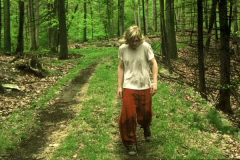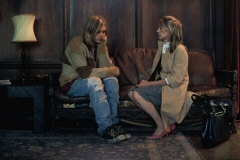Last Days (Gus Van Sant, 2005)
 Trained by narrative cinema, we have a
tendency when we watch a movie to want to “know” characters. This desire is
spurred on by despite the fact that the majority of movies operate on levels
facile enough to make us think we really do get to know characters on a
profound level by the time a movie ends. To point this out isn’t to disparage
conventional character development, but it’s an unavoidable fact that such
development is
so often a lie or a manipulation designed to get us to accept the rest of a
movie’s agenda. Complaints that Gus Van Sant, in his most recent trio of
films, doesn’t engage in this trickery during his inquiries into character
seem an embrace of artifice in the good name of truth. “How dare he not
articulate the unknowable?” people seem to be asking when they note that the
director doesn’t try to bluff an answer in these movies, not realizing that
the films exist not so we can understand their subjects (an impossibility), but
can better understand our way of coming to terms with their existence. His
approach in each of the films (Gerry, Elephant and, now, Last
Days) is to record his subjects in takes so long that they begin to feel
like real-time, and observe them more than he chooses to comment on them as they
begin to brush up against death. Last Days, a fictionalized account of
the death of Kurt Cobain (renamed Blake here), seems to begin at the precise
moment that its protagonist decides to kill himself.
Trained by narrative cinema, we have a
tendency when we watch a movie to want to “know” characters. This desire is
spurred on by despite the fact that the majority of movies operate on levels
facile enough to make us think we really do get to know characters on a
profound level by the time a movie ends. To point this out isn’t to disparage
conventional character development, but it’s an unavoidable fact that such
development is
so often a lie or a manipulation designed to get us to accept the rest of a
movie’s agenda. Complaints that Gus Van Sant, in his most recent trio of
films, doesn’t engage in this trickery during his inquiries into character
seem an embrace of artifice in the good name of truth. “How dare he not
articulate the unknowable?” people seem to be asking when they note that the
director doesn’t try to bluff an answer in these movies, not realizing that
the films exist not so we can understand their subjects (an impossibility), but
can better understand our way of coming to terms with their existence. His
approach in each of the films (Gerry, Elephant and, now, Last
Days) is to record his subjects in takes so long that they begin to feel
like real-time, and observe them more than he chooses to comment on them as they
begin to brush up against death. Last Days, a fictionalized account of
the death of Kurt Cobain (renamed Blake here), seems to begin at the precise
moment that its protagonist decides to kill himself.
 Last Days is a more dynamic
viewing experience than the slightly monotonous Gerry, but one that pales
in comparison to Elephant. By virtue of its subject matter (i.e. a
suicide prompted by depression in which there was but one victim), the constant
tension, motivational contradictions and explosive shocks of Elephant
don’t exist here. That allows Van Sant to spin us deeper into the atmosphere
of Blake’s mind, at least as long as he chooses to remain focused on him.
Unfortunately, that is only for the first hour or so of the film, after which
the mood dissipates and the film becomes a series of character sketches. Van
Sant trots out one character after another, trying to illustrate the fact that
Blake refuses to communicate with them, but really only ensuring that his
audience finds it harder to communicate with him. Maybe audience identifcation
with Blake isn’t high on Van Sant’s list of things to accomplish in Last
Days (Michael Pitt’s mumbling, hair-in-face performance all but guarantees
that this is the case), but as other characters begin to take over the film’s
focus, it becomes increasingly hard as a viewer to re-enter Blake’s tortured
state of mind. The genius sound design, in which diegetic noises distort and
bleed into the half-formed ambient music, helps, as does Pitt’s consistency in
his role,
but it’s still a shame to see a film perfectly approximate a mood, only to let
it get away. This is especially so since Van Sant seems so acutely aware of his
intent that he trots out the contrived, soap opera plot of a Boyz II Men music
video to demonstrate exactly what he doesn’t want Last Days to be.
Last Days is a more dynamic
viewing experience than the slightly monotonous Gerry, but one that pales
in comparison to Elephant. By virtue of its subject matter (i.e. a
suicide prompted by depression in which there was but one victim), the constant
tension, motivational contradictions and explosive shocks of Elephant
don’t exist here. That allows Van Sant to spin us deeper into the atmosphere
of Blake’s mind, at least as long as he chooses to remain focused on him.
Unfortunately, that is only for the first hour or so of the film, after which
the mood dissipates and the film becomes a series of character sketches. Van
Sant trots out one character after another, trying to illustrate the fact that
Blake refuses to communicate with them, but really only ensuring that his
audience finds it harder to communicate with him. Maybe audience identifcation
with Blake isn’t high on Van Sant’s list of things to accomplish in Last
Days (Michael Pitt’s mumbling, hair-in-face performance all but guarantees
that this is the case), but as other characters begin to take over the film’s
focus, it becomes increasingly hard as a viewer to re-enter Blake’s tortured
state of mind. The genius sound design, in which diegetic noises distort and
bleed into the half-formed ambient music, helps, as does Pitt’s consistency in
his role,
but it’s still a shame to see a film perfectly approximate a mood, only to let
it get away. This is especially so since Van Sant seems so acutely aware of his
intent that he trots out the contrived, soap opera plot of a Boyz II Men music
video to demonstrate exactly what he doesn’t want Last Days to be.
 It never fails, exactly, or succumbs to
the tabloid inanity of something like Nick Broomfield’s documentary Kurt
& Courtney, but Last Days’ desire to fill space with characters
besides Blake is unmistakably its weak point. That’s not to say that Van Sant
has failed here. Last Days is an audacious work, and most of the time
that audacity pays off. The director's blatant sexualization of his young cast, for
example, sounds like a bad idea on paper, yet works on screen to help draw us
into the seedy milieu and immediate pleasures of the rock world. The set design certainly lives up to the music’s “grunge”
moniker, and the film’s frequent forays into the forest surrounding Blake’s
mansion counterbalance the interior scenes well. Pitt’s withdrawn presence pays dividends in
establishing mood and the decision to have the actor sing songs he penned
himself surprisingly avoids disaster and legitimately brings us closer to the
realization that this madman was quite talented. Last Days is playing
with fire, tackling a story that’s still a hotly debated media sensation, and
it’s startling just how iconic much of the Cobain imagery remains (and I was
never much of a Nirvana fan). For a film this undeniably artful and thoughtful
to emerge from that noise of sound bites is remarkable even if the end result occasionally stumbles, as it does in its final, very literal shot at
transcendence.
It never fails, exactly, or succumbs to
the tabloid inanity of something like Nick Broomfield’s documentary Kurt
& Courtney, but Last Days’ desire to fill space with characters
besides Blake is unmistakably its weak point. That’s not to say that Van Sant
has failed here. Last Days is an audacious work, and most of the time
that audacity pays off. The director's blatant sexualization of his young cast, for
example, sounds like a bad idea on paper, yet works on screen to help draw us
into the seedy milieu and immediate pleasures of the rock world. The set design certainly lives up to the music’s “grunge”
moniker, and the film’s frequent forays into the forest surrounding Blake’s
mansion counterbalance the interior scenes well. Pitt’s withdrawn presence pays dividends in
establishing mood and the decision to have the actor sing songs he penned
himself surprisingly avoids disaster and legitimately brings us closer to the
realization that this madman was quite talented. Last Days is playing
with fire, tackling a story that’s still a hotly debated media sensation, and
it’s startling just how iconic much of the Cobain imagery remains (and I was
never much of a Nirvana fan). For a film this undeniably artful and thoughtful
to emerge from that noise of sound bites is remarkable even if the end result occasionally stumbles, as it does in its final, very literal shot at
transcendence.
68
07.19.05
Jeremy Heilman